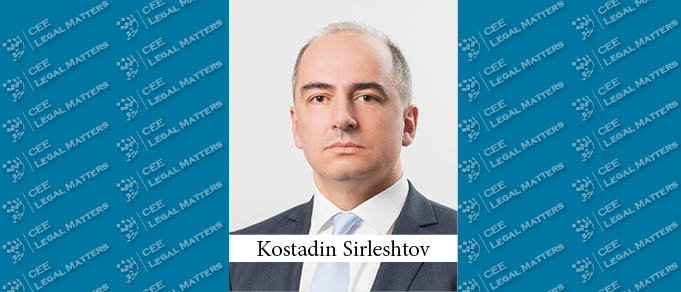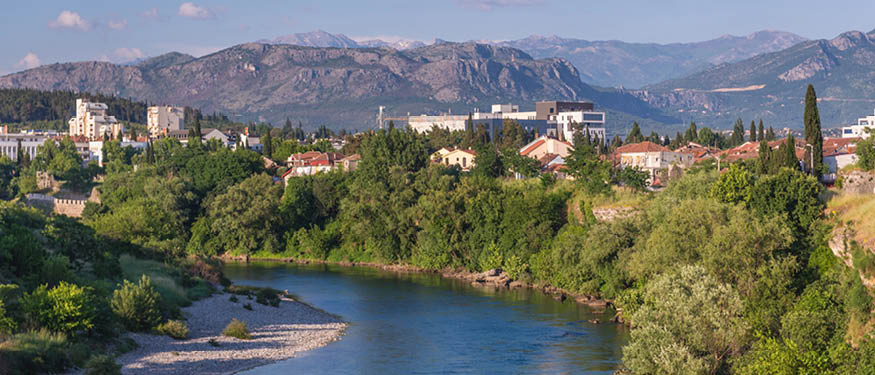On December 31, 2020, CEE Legal Matters reported that CMS had advised contractor Arkad on the completion of the Balkan Stream Gas Pipeline project. We reached out to CMS Sofia Managing Partner Kostadin Sirleshtov for more information about the deal.
CEELM: How did you and CMS become involved in the project?
Kostadin: As with many matters, this one started as a very small corporate mandate directed into the registration of a branch in Bulgaria and general regulatory advice on public procurement matters. The client was referred to CMS Sofia by another CMS office. There wasn’t really a selection process as such, as the initial advice was a very small and basic one. It happened around 4 years ago when the client started looking at Bulgaria given the public procurement opportunities, which were appearing on the market.
CEELM: What exactly was the initial mandate when you were retained for this project?
Kostadin: The client wanted to know how the Bulgarian law treated foreign public procurement contractors, what the requirements for participation in public tenders were, and the like. The mandate was a general regulatory one, well before the start of the actual project. CMS Sofia was assisting the client with the understanding of the regulatory environment and the risk allocation in infrastructure public procurement projects in principle. We were also assisting with all the corporate law and employment legal advice that the client needed. Once the public procurement was launched, the team fully embraced the project and assisted in the successful completion of the tender process.
CEELM: Who were the members of your team, and what were their responsibilities?
Kostadin: Over the last four years, we had almost half of our CMS Sofia lawyers involved in one way or the other in the project. I was the one that picked up the initial referral for the client and, for four years now, I am leading and monitoring the project on our end. For the last two years, as the workload increased, we were asked to allocate a senior lawyer to work almost exclusively for the client. The client picked the most experienced and knowledgeable senior lawyer in the field of oil & gas with CMS Sofia – Denitsa Dudevska. I am quite confident in suggesting that Denitsa was the member of our team who was the largest contributor to the success of the project on our end. As the project required coordination with many other CMS offices, it was me and various Associates ensuring fluent communication and collaboration with other offices. CMS Sofia assisted a lot on various financial and employment matters, where the work was led by Senior Associate Borislava Piperkova. The tax-related questions and issues were addressed by our Head of Tax Senior Associate Alexander Rangelov. I will stop here just to avoid the risk of missing someone.
CEELM: Describe the Balkan Stream project in as much detail as possible.
Kostadin: The concept for the establishment of a gas distribution center on the territory of Bulgaria is based on the idea that significant natural gas quantities, from various sources, are entering the country through several real physical points, for further transportation. At the same time, a gas trading point/hub is also being established, where each market participant carries out transactions in natural gas on a market-based principle. The idea for the building of a regional gas center is supported by the strategic geographical location of Bulgaria, the well-developed existing gas transmission and storage infrastructure, and the interconnection projects with Turkey, Greece, and Serbia, as well as the completion of the connection with Romania.
Specifically, the Balkan Stream project represents a complex, multicomponent, staged project for the modernization, rehabilitation, and expansion of the existing gas transmission infrastructure on the territory of Bulgaria, owned and operated by the combined gas operator Bulgartransgaz EAD.
The project has been implemented in phases and includes: (i) modernizing and rehabilitating compressor stations; (ii) repairing and replacing gas pipeline sections following inspections; (iii) expanding and modernizing the existing gas transmission network; (iv) carrying out inspections to determine and characterize the gas pipelines’ condition; (v) and implementing systems for optimization of the management process of the network technical condition.
The Balkan Stream project is an extension of TurkStream, which begins at the Russkaya compressor station near Anapa, in Russia, and crosses the Black Sea into Turkey. The extended 474-kilometer Balkan Stream pipeline runs from Bulgaria’s southern border with Turkey to its western frontier with Serbia. With the completion of the Balkan Stream Gas Pipeline project, the natural gas coming from TurkStream will now progress through Bulgaria into Serbia, Hungary, and Austria.
CEELM: What is the current status of the pipeline?
Kostadin: The project is now complete and the pipeline is operational.
CEELM: What was the most challenging or frustrating part of the process? And why?
Kostadin: Any project of this magnitude (exceeding EUR 1 billion in capital expenditures) exposes the stakeholders to many challenges. This project wasn’t any different. The initial main challenge was faced at the time of the actual tender and the following challenges and appeals. We managed to successfully overcome these just to face the next set of challenges, related to the construction process and short deadlines. Once we streamlined the construction process preparation, we were hit by COVID-19 and the impact on an international project of such magnitude was huge. CMS managed to assist with the justification and the achievement of as many as 5 force majeure certificates from Bulgarian authorities to justify the delays, which were attributable to the pandemic. As a result, no liquidated damages were imposed on the client by its customer.
CEELM: Was there any part of the process that was unusually or unexpectedly smooth?
Kostadin: The smoothness of the construction process (given the circumstances) was something that pleasantly surprised me. The project included many jurisdictions and many stakeholders, but I am happy to report that the efficiency of the project implementation was something that you don’t see in every project of such magnitude.
CEELM: Did the final result match your initial mandate, or did it change somehow from what was initially anticipated?
Kostadin: The final result had nothing to do with the initial mandate that we were provided with, but the final result was in full compliance with the objectives of the client and, therefore, I am happy that CMS Sofia and the rest of the CMS offices involved delivered the best quality legal advice and services required, in a timely manner.
CEELM: What specific individuals at Arkad directed you, and how did you interact with them?
Kostadin: The client’s team consisted of many individuals, but my direct contact was particularly with the Head of Legal, who was coordinating legal functions on the client’s end.
CEELM: Quite a few firms were involved in this deal – CMS, ANG, Dentons, KPMG Legal, TBK, and Latham & Watkins. How difficult was it to coordinate/communicate between so many different teams?
Kostadin: As the project was very complicated, including separate work-streams such as public procurement, construction, financing, and others, these law firms had different functions. CMS was in contact with most of the law firms involved – either directly, or through our client. The level of coordination demonstrated by the client was extraordinary and, given the professionalism of the law firms involved, this guaranteed the positive results that followed. At times, projects of this nature look chaotic and therefore require strong coordination efforts, but I do believe CMS had its fair share of contribution to the successful coordination of the entire process.
CEELM: How would you describe the significance of the pipeline to the Balkans and CEE in general?
Kostadin: Projects exceeding EUR 1 billion in the Balkans and CEE more often fail than get to the finish line. From a legal and project management point of view, the project is something that all law firms, consultants, and others should be proud of. Such success stories usually lead to a higher investment appetite and an increase in foreign investment for Bulgaria and for the region. The project will allow for greater access of natural gas to the Balkans and to CEE, and, together with the rest of the interconnections and the other pipelines that are in the works, will hopefully lead to a higher diversity of supply.
This Article was originally published in Issue 8.6 of the CEE Legal Matters Magazine. If you would like to receive a hard copy of the magazine, you can subscribe here.

















